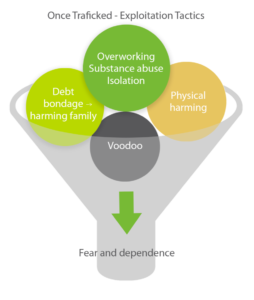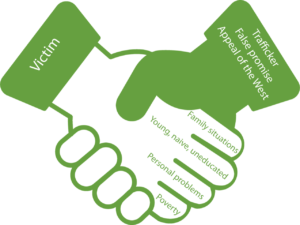Human trafficking and exploitation we also call modern slavery. The number of victims of this has been growing worldwide for years, including in the Netherlands. Too often it is wrongly thought that this does not exist in the Netherlands, while in reality we see it in all layers of society.
It is estimated that the Netherlands has somewhere between 6,250 to 30,000 survivors of this modern slavery every year. Many of them are illegal, unregistered and therefore invisible. These women and men are often (even as children) smuggled into Europe under false pretences and then (re)sold, mistreated and exploited.

TheBridge2Hope's founder Dr. Sheetal Shah (PhD) conducted research into modern slavery in Amsterdam-Zuidoost in 2012, entitled 'The Bijlmer Project'. This project helped establish TheBridge2Hope. International scientific research into supporting survivors of trafficking and sexual exploitation continues. New insights are being used to sharpen the Academy and the Advocacy. TheBridge2Hope conducts this research in collaboration with a.o. the Lead University, Webster University, CKM - Centre against Trafficking in Human Beings and Sustainable Rescue.
The process of human trafficking
Often the process of human trafficking starts in the home country. There are so-called push and pull factors. The push factors make victims feel encouraged to look for a new life. The pull factors make victims feel attracted to a new life somewhere else.
Push factors
Push factors that emerge from the research are:
- Poverty and unemployment.
- Family situations, such as the death of parents/roommate, divorce, polygamy and early pregnancy.
- Personal problems such as rape, abuse and homosexuality.
- Victims are often young, naive and unskilled, which makes it impossible for them to assess the risk sufficiently.
Pull factors
Pull factors that emerge from the research are:
- False promises, like a job or wealth.
- Manipulation by traders.
- The idea that the quality of life in the West is better, causing risks to be misjudged.

"He told me to work as a prostitute. I told him, "No, you didn't promise me this and this wasn't our deal. He said I had to work to pay him the 100,000 euros, because that's the money he had spent on me and my children in Nigeria".
Exploitation of victims
After moving to the Netherlands, most are permanently exploited. It is unthinkable in what kind of circumstances these people have to live. Reasons to stay in these circumstances:
- There is physical, mental and emotional abuse (abuse, rape, or other physical harm inflicted by a trader/pimp).
- Threats to harm family members in the homeland.
- Social isolation (by taking passports, confinement in flats or lies to prevent victims from seeking help, and administering (addictive) drugs).
- Voodoo is used in the country of origin. Many victims believe in this, and have promised the voodoo gods not to flee. They believe that they or their families will be cursed if they do.


Support the research of TheBridge2Hope and help prevent traffickers from making new victims.
Our published research on modern slavery
These articles, excerpts and papers provide a deeper understanding of factors surrounding human trafficking:
Paper presentation for Slavery Past Present and Future (SPPF) global conference, Berlin:
The Key Aspects of Promoting Survivor Resilience:
Once I was a Victim, now I am Free (2018)
Author: Amanda Mauro
Read paper
Paper presentation for SPPF, Innsbruck:
Understanding the power of Juju: The cultural practice used as an exploitative tactic in sex trafficking (2019)
Author: Amanda Mauro
Read paper
Victim 'Post Pimp' Stage: Characterizing the journey of undocumented victims of human trafficking in the Bijlmer, Amsterdam South-East, to identify the critical components of an intervention program
Authors: Sheetal Shah, Madeleine van der Steege, Tom Marfo, Dian Karnina"
Trafficked and Sexually Exploited Men: Understanding and Responding to the Experience.
Authors: Shah, S; Marfo. T.; Mauro, A; Comenencia, C.
Human Rights in Higher Education: Institutional, Classroom, and Community Approaches to Teaching Social Justice.
Chapter title: The Bijlmer Project: Moving the classroom into our community to combat human trafficking
Author: S. Shah
Editor: L.Kingston
Why Slavery Endures (November 18th, 2020)
Chapter Title: The Bijlmer Project: Developing a Psychological Treatment Service for Victims of Trafficking and Sexually Exploited Individuals in the Netherlands.
Author: S. Shah and T.Marfo
Editor: D.Bulla
Healing Trauma through Yoga: Assessing the effectiveness of a 6-week Trauma-Informed Yoga Therapy intervention on the PTSD symptoms of women survivors of complex sexual exploitation & abuse.
Authors: Stefania Herrera Guzman and Sheetal Shah
Read paper
SPPF 6th global meeting
Role: Part of steering committee
Hosted in Leiden (Summer 2022)
Journal of Human Trafficking
Guest Editor for peer review
Collaboration with Global Network of Psychologists for Human Rights (GNPHR).
The GNPHR wants to be a platform of and for all psychologists concerned about human rights and interested in the connection of psychology and human rights. Learn more



